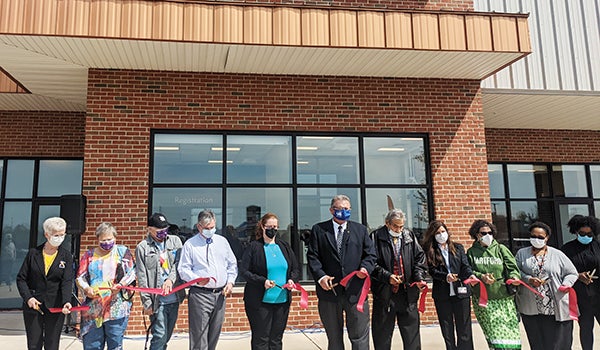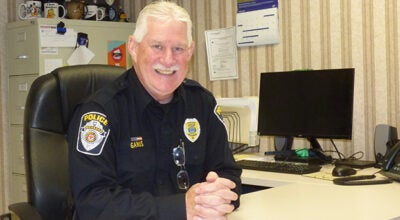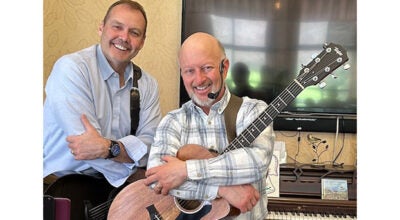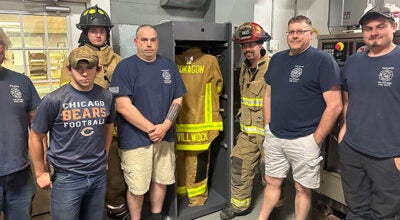Ribbon-cutting ceremony celebrates Pokagon Band’s new Benton Harbor health clinic
Published 4:08 pm Monday, April 26, 2021
|
Getting your Trinity Audio player ready...
|
BENTON HARBOR — “Mshkiki” is the Potawatomi word for medicine, and the Pokagon Band of Potawatomi is doing its part to provide community members with medical services.
A small group of attendees gathered outside 1986 Mall Place at Orchard’s Park Shopping Center in Benton Harbor Monday morning to celebrate the opening of the Pokagon Band of Potawatomi’s new Mshkiki Community Clinic.
Members of the Pokagon Band Tribal Council participated in a ribbon-cutting ceremony to celebrate the opening of the clinic, which is a division of its Pokagon Health Services department.
The new clinic aims to serve the primary medical and dental care needs of Medicaid-eligible and low-income residents living in Benton Harbor and Benton Township. The clinic will operate from 8 a.m. to 5 p.m. Monday through Friday and will consist of nine full-time staff members once fully staffed.
Officials anticipate the clinic will open its doors for patients by the end of May.
“To be able to put this together during the 14 months that we’ve suffered from the pandemic, with all the unknowns and unpredictability, has been impressive,” said Matthew Wesaw, Tribal Council Chairman of the Pokagon Band of Potawatomi. “This will help benefit not only our people but the people in the Benton Harbor and township areas. This is going to be a well-needed and well-deserved option for their health care.”
Following the ribbon-cutting ceremony, those in attendance were offered tours of the new clinic, which will offer primary medical care services including acute care, chronic disease management, immunizations, minor procedures, routine exams and well-child visits. The clinic’s respiratory services include respiratory care for potential COVID-19 or other respiratory infections, COVID-19 testing and COVID-19 vaccinations.
Dental care services include cleanings, routine exams, fillings, extractions, root canals, x-rays, bridges, crowns, dentures and partials.
According to a Pokagon Band press release, adults in Michigan who qualify for Medicaid include those that make $16,000 or less for a single person or $33,000 or less for a family of four. According to the 2019 Census numbers, 46 percent of Benton Harbor’s 9,000 residents and 33 percent of Benton Township’s 14,000 residents would qualify for Medicaid and could receive services at the Mshkiki Community Clinic.
Unlike other Medicaid participating clinics, Tribal Health Centers do not collect copays from Medicaid patients.
“Pokagon Health Services has been serving indigenous peoples in southwest Michigan and northern Indiana since 1996,” said Priscilla Gatties, director for Pokagon Band of Potawatomi’s Department of Health Services. “It’s an accredited healthcare facility located within the Pokagon Band’s government campus in Dowagiac, Michigan currently serves more than 2500 patients and offers an integrative care approach that includes Medical, Dental, Pharmacy, and Behavioral Health services.
“When the COVID-19 pandemic hit in March of 2020, it brought more attention to the health disparities in not only Native Americans but also in other minority groups as compared to the general population. Now more than ever, our communities need to have a choice of where they can access the best and most effective healthcare, and Pokagon Health Services is pleased to be able to provide an additional option to the residents of Benton Township, Benton Harbor and surrounding communities through the Mshkiki Community Clinic.”
Wesaw believes the clinic will serve to complement Dowagiac’s Pokagon Health Services facility at the Rodgers Lake Campus.
“It will complement us in a sense that tribal citizens who live over in this area can choose to come here if the services available make it a lot easier for them,” Wesaw said. “It will also complement in the sense that this is our home, this is our community. So, whenever we do something it’s not just for us, but it’s also for the other people that live here because they are our friends and neighbors. Being able to help them get some specialized health care needs that they might not normally have access to is what we’re all about.”







